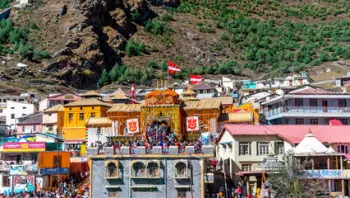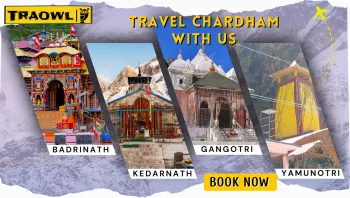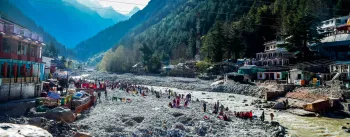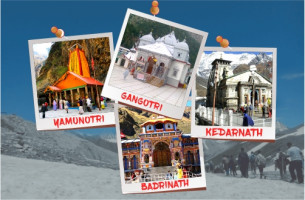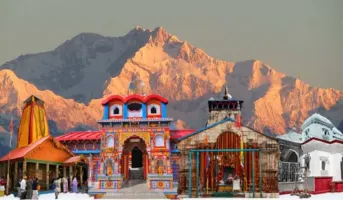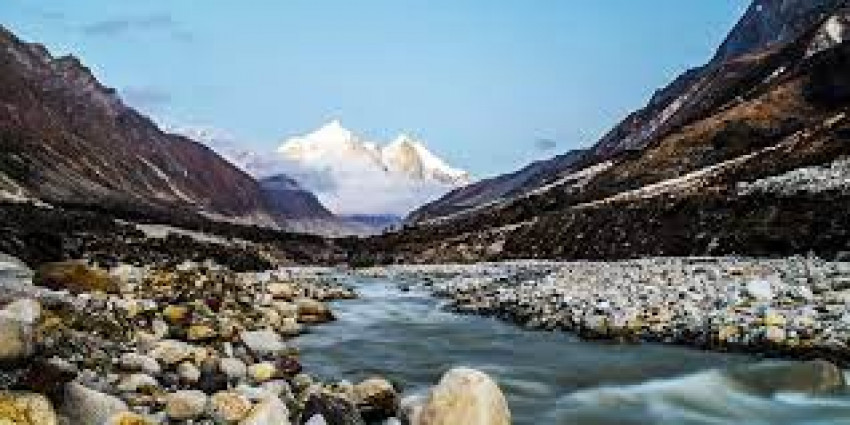
Gangotri
Duration
2 to 4 Days
2 to 4 Days
Best time to visit
May-Jun, Sep-Oct
May-Jun, Sep-Oct
Theme
Hill Station, Religious
Hill Station, Religious
Gangotri Travel Guide
Gangotri, located in the Uttarkashi district of Uttarakhand, India, is a significant pilgrimage site for Hindus. It holds immense historical and cultural importance as it is believed to be the origin of the holy River Ganges. The town is nestled amidst the Garhwal Himalayas, offering breathtaking views of snow-capped peaks and serene surroundings. Gangotri is famous for its religious significance, attracting devotees and nature lovers alike.Top Attractions in Gangotri
1. Gangotri Temple 2. Gaumukh Glacier 3. Bhairon Ghati 4. Pandava Gufa 5. Kedar TalGangotri is Famous for
Its spiritual significance as the source of the River Ganges.Top Attractions in Gangotri
- Gangotri Temple - Gaumukh Glacier - Bhairon Ghati - Pandava Gufa - Kedar TalWhat's Great about Travelling to Gangotri?
- Spiritual experience for devotees - Serene and picturesque landscapes - Adventure activities like trekking and campingWhat's Not So Great about Travelling to Gangotri?
- Limited accommodation options - Harsh weather conditions in winter - Remote location with limited connectivityTravel Tips for Gangotri
- Carry sufficient warm clothing - Acclimatize to high altitudes gradually - Respect local customs and traditionsImportant Gangotri trip information
- Ideal Duration: 3-4 days
- Best Time to Visit: May to June and September to October
- Nearby Airports and Railway Stations: Jolly Grant Airport in Dehradun and Rishikesh Railway Station
Per Person
18,800
*EXCLUDING APPLICABLE TAXES 3.9 Ratings
( 74 Reviews )
( 74 Reviews )
Per Person
19,999
*EXCLUDING APPLICABLE TAXES 4.5 Ratings
( 31 Reviews )
( 31 Reviews )
Per Person
17,660
*EXCLUDING APPLICABLE TAXES 3.9 Ratings
( 74 Reviews )
( 74 Reviews )
Per Person
67,890
*EXCLUDING APPLICABLE TAXES 4.4 Ratings
( 314 Reviews )
( 314 Reviews )
Per Person
28,680
*EXCLUDING APPLICABLE TAXES 4.9 Ratings
( 362 Reviews )
( 362 Reviews )
Per Person
29,500
*EXCLUDING APPLICABLE TAXES 4.5 Ratings
( 31 Reviews )
( 31 Reviews )
FAQ's on Gangotri
Q1: What is the best time to visit Gangotri?
The best time to visit Gangotri is during the summer months of May to June and September to October. These months offer pleasant weather for exploring the region, with clear skies and comfortable temperatures. Avoid visiting during the monsoon season (July and August) due to heavy rainfall which can disrupt travel plans. Winter (November to April) is also not recommended for casual tourists as the region experiences heavy snowfall and extremely cold temperatures.
Q2: Do I need a visa to travel to Gangotri?
Gangotri is located in India, and most tourists will require a valid Indian visa to visit. Check with the Indian embassy or consulate in your country for specific visa requirements. Some nationalities may be eligible for e-visas or visa-on-arrival, so it is essential to research and apply for the appropriate visa type before traveling to Gangotri.
Q3: What are the must-visit attractions in Gangotri?
Gangotri is famous for the Ganges River and the Gangotri Temple, which is a significant pilgrimage site for Hindus. Other must-visit attractions include the Gaumukh Glacier, the origin of the Ganges, and the stunning views of the surrounding Himalayan peaks. Trekking and exploring the pristine natural beauty of the region are also popular activities for visitors to Gangotri.
Q4: Is Gangotri a safe place to travel?
Gangotri is generally a safe destination for travelers. However, it is essential to take precautions against altitude sickness, as the region is located at high elevations. It is advisable to acclimatize properly, stay hydrated, and follow local guidelines for trekking in the Himalayas. Avoid traveling alone in remote areas and be cautious of the weather conditions, especially during the monsoon season.
Q5: What is the local currency in Gangotri and can I use credit cards?
The local currency in Gangotri is the Indian Rupee (INR). While some hotels and larger establishments may accept credit cards, it is recommended to carry cash for smaller purchases and in remote areas. ATM facilities are limited in Gangotri, so it is advisable to withdraw sufficient cash before heading to the region.
Q6: What is the local cuisine like in Gangotri?
The local cuisine in Gangotri is predominantly vegetarian, with a focus on simple and hearty meals. Popular dishes include Rajma Chawal (kidney beans with rice), Aloo Puri (potato curry with fried bread), and local sweets like Bal Mithai and Singori. Due to the religious significance of the region, non-vegetarian food and alcohol may be limited in availability. Travelers with dietary restrictions should inform restaurants in advance for suitable options.
Q7: What transportation options are available in Gangotri?
In Gangotri, transportation options are limited due to its remote location in the Himalayas. The most common way to reach Gangotri is by road, either through private vehicles or shared taxis from nearby towns like Uttarkashi. Public buses also operate on select routes, but schedules may be irregular. Within Gangotri town, walking is the primary mode of transportation, as the area is relatively small and best explored on foot.
Q8: Are there any cultural norms or etiquette I should be aware of when visiting Gangotri?
When visiting Gangotri, it is important to respect the religious customs and traditions of the region. Modest attire is recommended, especially when visiting temples and religious sites. Remove your shoes before entering temples and show reverence towards sacred objects. Avoid public displays of affection and maintain a respectful distance from locals, particularly during religious ceremonies. Ask for permission before taking photographs of people, and be mindful of local customs regarding food and dining practices. By showing respect for the local culture, you can have a more enriching and meaningful experience in Gangotri.
Q9: I am a travel agent. How can I buy travel leads of Gangotri?
Register yourself as a travel agent at agents.tripclap.com and then you can buy travel leads to Gangotri once your account is approved. For more details contact our support team at +91-8069186564 or support@tripclap.com
